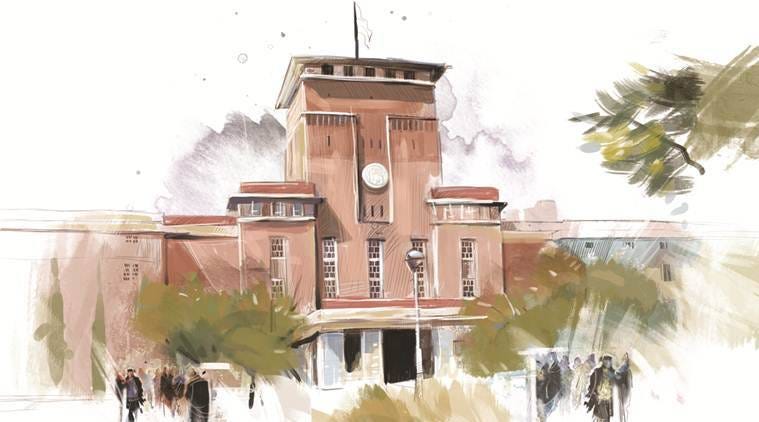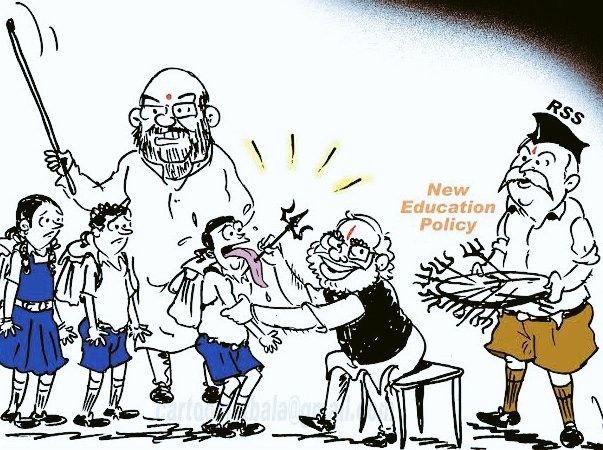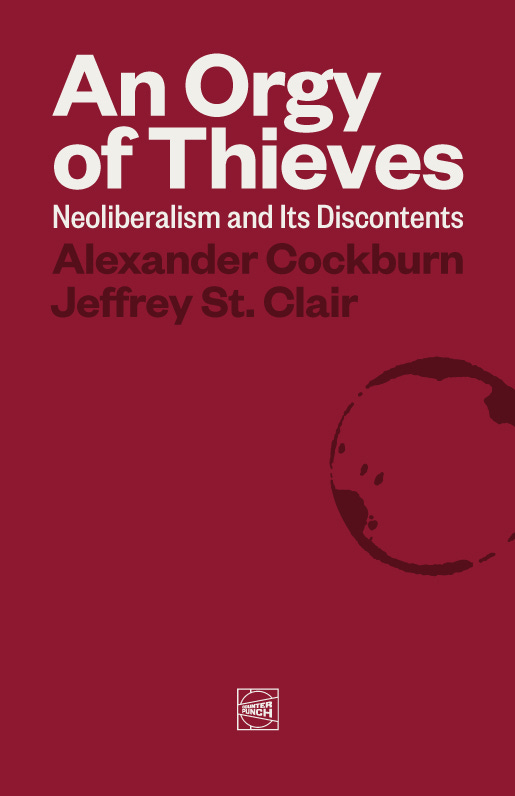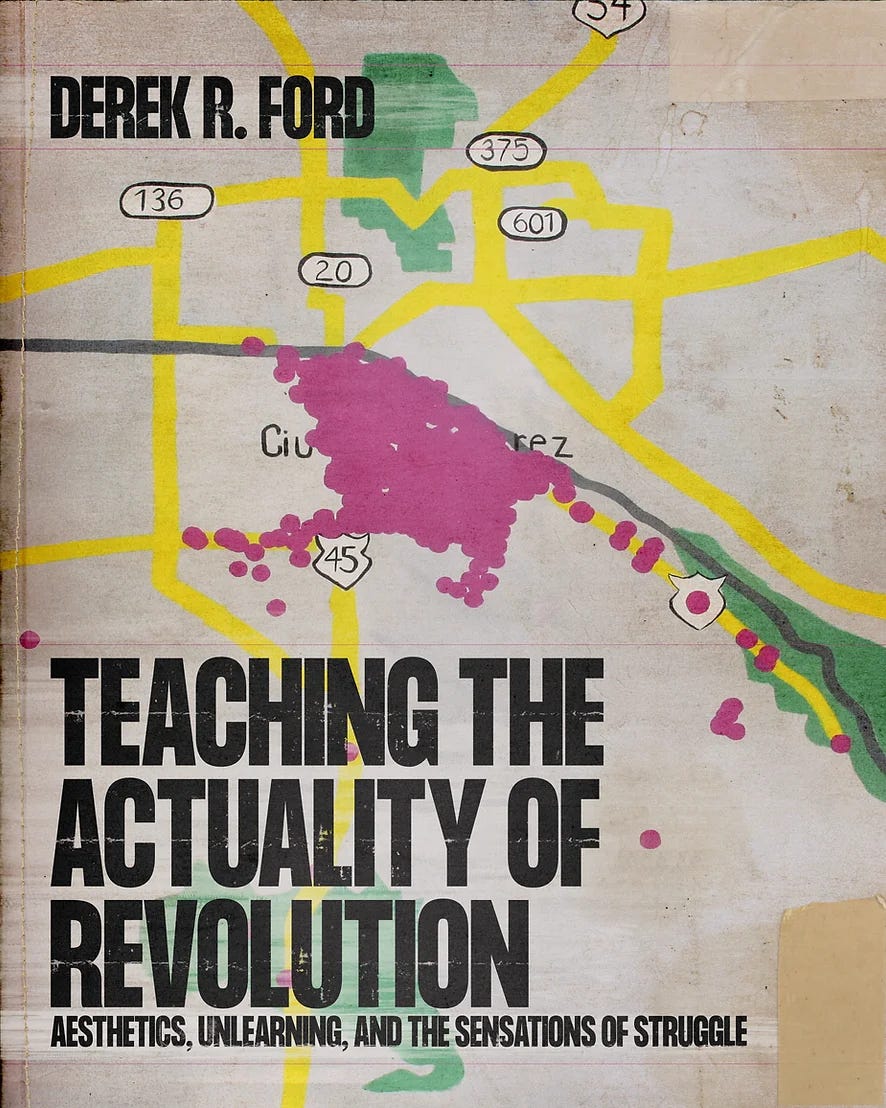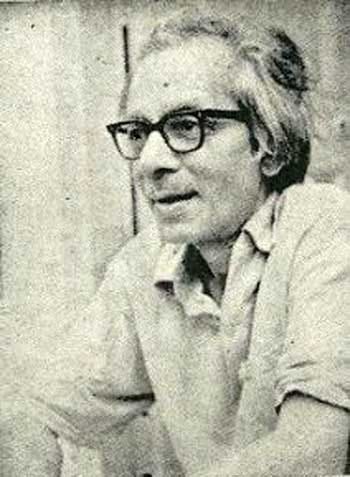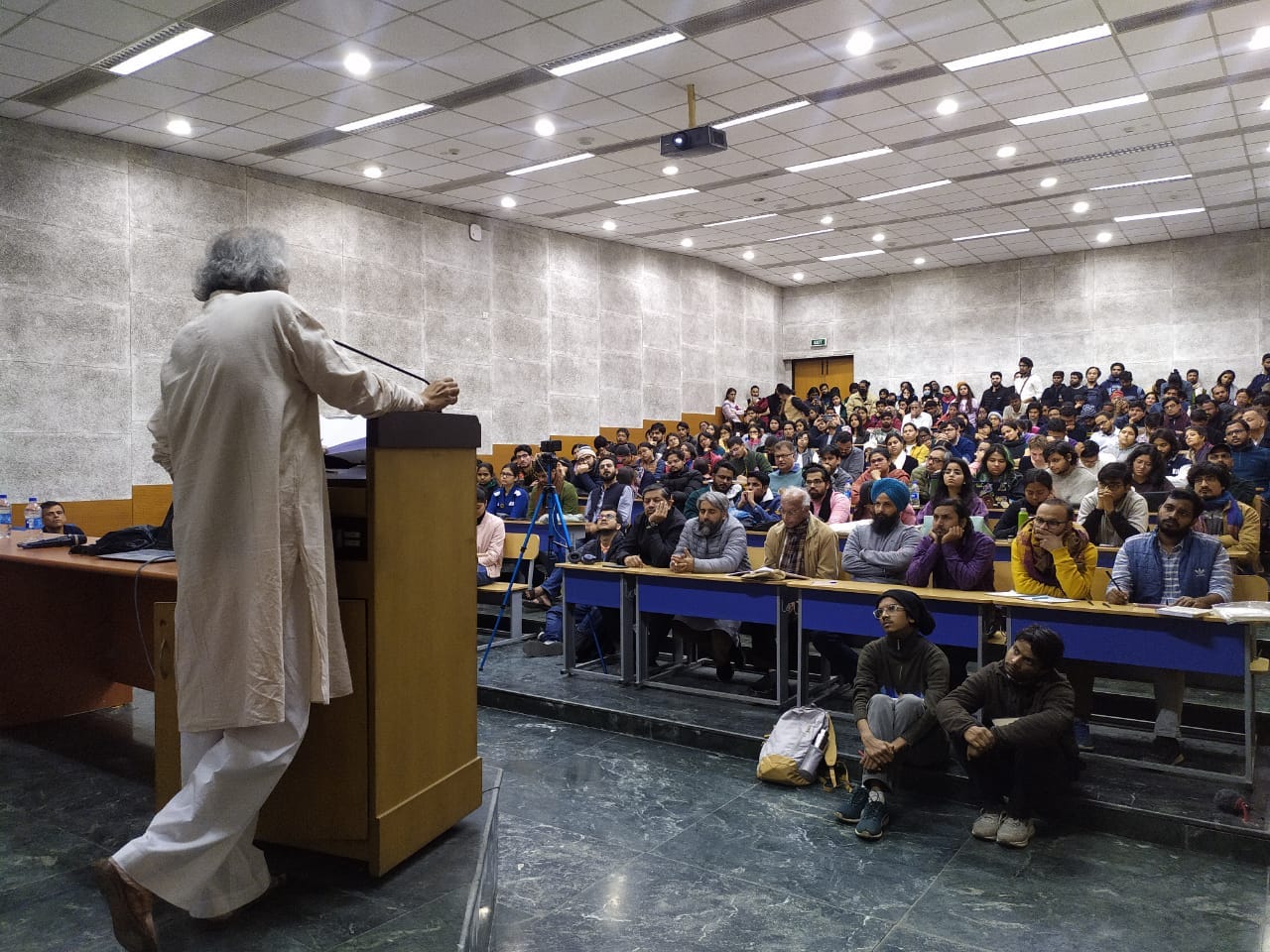What we are reading and looking forward to read
The past few months have seen teachers appointed on a temporary, 'ad-hoc', basis at the University of Delhi being removed from their jobs in large numbers. Mukul Mangalik, former teacher of history at Ramjas College, wrote an article for The Wire on the cruelty of this move, as well as the injustice of the precarious conditions in which these teachers have been employed for years. He responds to the callousness of this decision by invoking the 'histories of work' created by them. They have had to do the same, and often a greater, amount of work as the permanent teachers, for no job security or benefits to speak of, nor any prospect of promotion. Yet, their work has been central to the sustenance of everyday academic activity and the creation of a culture of free inquiry, creativity, and democratic functioning. All the members of the Study Circle so far have been students at Delhi University. The spaces of the university and the intellectual culture we found there have been crucial to our development, both as individuals and as a group. Therefore, we are heartbroken and angered to be witnessing this attack on the people who have made the university what it is for us.
Here again, we see a convergence of neoliberalism and Hindutva. It was around 2009-10 that ad-hoc appointments, rather than being a stopgap measure, became the norm for the employment of teachers at Delhi University. They are part of a larger move by the state to withdraw from public universities, leaving the field of higher education completely open to private investment. The BJP's coming to power has only accelerated this change. The functioning of public universities is now, in fact, determined further by the political imperatives of the Sangh parivar. In the past few years, they have aggressively pushed new syllabi into the classroom. Teachers have been excluded from this process and their voices muffled by a university administration increasingly under the ideological and bureaucratic control of the Sangh parivar. Now, teachers themselves are being displaced en masse, and the interviews for permanent employment being conducted to replace them reportedly favour candidates who are willing to toe the Sangh's line, or indeed, openly support it. It is hard, after having witnessed the rapid decline of the public university, and now to be witnessing the treatment being meted out to our teachers, to not feel that higher education as we knew it has reached its end. Yet, Mangalik ends his piece by making a case for hope and calling for solidarity with the ad-hoc teachers of DU.
The acute and deepening crisis of funding that public universities in India have been facing for a long time is hardly a new revelation. In this incisive piece, Sukanta Chaudhuri, who has both observed and contributed to the erstwhile flowering of a robust state-funded pedagogical and research ecosystem in West Bengal, underlines the various ways in which public universities are being systematically dismantled now, taking Jadavpur University as a case in point. Besides the glaring asymmetry in funding for central institutions like the IITs and state universities like Jadavpur, the existing avenues of assured support have withered away—be it grants under the now-discontinued Five-Year plans, or the promised support under the RUSA (National Higher Education Scheme) programme. Existing infrastructure—buildings, libraries, and labs—are decaying and newer ones often face punctuated support. This is coupled with the slow mushrooming of private universities that cash in on the despair of students and are inherently exclusionary in nature. Given the evidence of excellent research still being produced within the confines of these decrepit public institutions, Chaudhuri argues that a little more support can help them immensely to survive and keep contributing meaningfully to the society they are embedded within.
We have been reading this rather polemical and provocative piece by Gabriel Rockhill, a French-American philosopher, who goes to great lengths to lay bare what he calls the ‘dialectical sophistry’ of ‘capitalism's court jester’—Slavoj Žižek. Gabriel’s approach is one of unpacking Žižek’s theoretical corpus and juxtaposing the contradictions in his thought with those in his praxis, by carefully peering through his public political utterances and endorsements in lectures, interviews, and writings. He documents in detail Žižek’s frequent reactionary responses to topical issues, and asks why, in spite of his outright Eurocentric, and often pro-imperialist, ill-informed positions, he continues to be projected and revered as one of the most prominent intellectuals of the Left. In other words, he asks: why would the bourgeois cultural apparatus seek to amplify the political positions of a self-proclaimed Marxist?
Gabriel tries to answer this by locating Žižek in a broader context— as a cultural product of the perverse and decadent ‘global theory industry’. He demonstrates how theorists like Žižek rose to prominence by cosplaying as communists whilst heaping scorn on politico-economic experiments in actually existing socialist states such as USSR, China, or Cuba for that matter. Gabriel argues that although Žižek borrowed his theoretical insights from the Marxist tradition, his purpose has been to render those disingenuous and meaningless by ‘subjecting them to a playful postmodern cultural mash-up’—making saleable wares out of radical ‘new’ ideas—his ‘big’ contribution to socialism being nothing but an echo of the repetitive assertion of all free-market fundamentalists: that it is impossible, and therefore deserves only to be ridiculed. Gabriel concludes with a rather sardonic punch:
Žižek’s mantra is nothing but an opportunistic perversion of the closing lines of The Communist Manifesto: ‘Cultural consumers of the pro-Western world unite—and buy my next book, or movie, or crossover product, or whatever, and so on, and so on!’
We are excited about two books that have come out quite recently: An Orgy of Thieves: Neoliberalism and its Discontents by Alexander Cockburn and Jeffrey St. Clair, and Teaching the Actuality of Revolution: Aesthetics, Unlearning and the Sensations of Struggle by Derek R. Ford.
What we are listening to and watching
While delivering the first M R Narayana Kurup Memorial Lecture, Geetanjali Shree presents her views on the longstanding debate: should writers be held responsible as legislators of the world? She begins by addressing three facets of loneliness that she underwent while writing—choosing Hindi as her language of expression, being an author who also happens to be a woman, and pursuing a career which is by definition solitary. she argues that it is important to distinguish between the categories of ‘useful’ and ‘productive’, invoking the thoughts of J.S. Mill, as writing is still not considered a ‘valid’ profession by many, if done only for pleasure. Shree considers literature as the story of life and thought. Intermeshed in a Jungian collective unconscious, it preserves a language that is complete-in-itself. It can and often needs to be auto-referential. Speaking of the Indian literary world, she draws a connection between the colonial past and the carnivalesque present, rejecting the demand for immediacy in literature. Bringing forth Tagore’s critique of mobocratic nationalism and the Kafkaesque ghetto, Shree talks about the contemplative, obsessive and civilizing nature of literary endeavors. The lecture ends with a story by Paul Zakaria and the ‘uncomfortable truths’ depicted on relief by Indian temple-murals, urging the audience to surrender to the empathetic quality of literature instead of giving in to oppressive statist discourses.
In a rather sombre tone, Satyajit Morang sings of his daily trials and tribulations while grazing buffaloes in the riverine islands of the Brahmaputra valley. His material conditions are hard, and he finds solace in his music. He longs for the love of his life, and his family, but is tied to his buffaloes in such a way that he cannot meet his loved ones at his own will. Unlike artefacts within the all-engulfing frame of the ‘Culture Industry’, Satyajit's heartfelt voice represents not just him, but many others like him, who tirelessly go through the same ordeals everyday. While listening to his melodious song, sung in the Oinikom style common among the Miring people of Assam, one is forced to ponder upon questions about what we can define as art, love, and life, in general.
What’s cooking in the Study Circle
In our last reading session, we read the third chapter from Hans-Georg Gadamer’s book Dialogue and Dialectic called ‘Plato and the Poets’ available for downloading on our blog. Do read Suchintan Das’s annotated translation of Samar Sen's 1972 short Bangla essay on intellectuals, compliance, dissent and everything in between: 'Chandrabindu Baade' for Lokayata, if you haven’t already.
It is rumoured that conflicts often arise in the mind-worlds of intellectuals, though only among those who are somewhat conscientious. Bertrand Russell was financially well-placed: the connection between his livelihood and the evolution of his thoughtscapes was not very close. However, such independent-minded people are rare in our country. The primary feature of the conflict that plagues the mind-worlds of intellectuals here is the contradiction with work or action. In other words, the occupation one is engaged in or the work that one does, is often at odds with one’s ideals and values. This results in guilty conscience. Many manage to eventually adapt to this condition through self-justifications and compromises. A few who are unable to do that find themselves in the unenviable position of being neither insiders nor outsiders.
[...] There is probably no need for any serious discussion on the role of intellectuals under the present circumstances. Perhaps those whom we do not consider intellectuals will change the world as we know it before their intellect can be commercialized. Moreover, those who toil for a living are hardly considered intellectuals per se. At least you do not need to demonstrate customary deference to write about them.
On the 20th of January, we organised ‘The Second Satyam Jha Memorial Lecture’ in collaboration with the Centre For Philosophy, JNU, at the Convention Centre of the university, in Delhi. Prof. Akeel Bilgrami, the Sidney Morgenbesser Professor of Philosophy at Columbia University, delivered the lecture on the topic ‘How far can the questioning of modernity be taken?’ Prof. Manidipa Sen of JNU chaired the session. This lecture was also streamed live from the Study Circle's Facebook page. We organise this annual memorial lecture to remember our dear friend and colleague Satyam Jha, who was a first-year undergraduate student of History at St. Stephen's College, Delhi, and unfortunately succumbed to COVID-19 on May 25, 2021. In his short life, Satyam demonstrated exceptional clarity of thought and a political sensibility that was rooted in his firm commitment to socialist solidarity and mutual aid. An eclectic reader and avid debater, Satyam was deeply interested in philosophy, critical theory and political praxis.
As a member of the Study Circle, Satyam contributed immensely in the short time of his association with this collective. His incisive arguments and observations during the reading sessions and his superb translation of Rahul Sankrityayan's essay "Dimaagi Gulami" for the Lokayata Blog testify to this. In the days before his demise, Satyam tirelessly volunteered to help people affected by COVID-19 as part of several student-led helpdesks: arranging hospital beds and oxygen cylinders at moment's notice during odd hours. A remarkably compassionate individual, Satyam has left a lasting imprint on the lives of his friends and acquaintances with his sharp intellect, rare humility, and warmth of character. We miss him dearly and cherish him in our own way every year on and around his birthday, January 20th. Last year, the inaugural lecture was delivered online by Prof. Marcus Redikar of the University of Pittsburgh on the topic ‘Reflections on History from Below’.
What we are thinking about
In the summer of 1994 in London, Jacques Derrida presented his audience with the image of the arkhe, as a place where things begin, where power originates, its workings inextricably bound up with the authority of beginnings. In the brief account of the operation of the Greek city-state that he gave on that occasion, he pointed to its official documents, stored in the arkheion, the superior magistrate's residence. There, the archon himself—the magistrate—exercised the power of procedure and precedent, asserting his right to interpret for the operation of a system of law. In Derrida's description, the arkhe—the ‘archive’—appears to represent the here and now of whatever kind of power is being exercised, anywhere, in any place or time. It represents a principle that, in Derrida's words, is ‘in the order of commencement as well as in the order of commandment.’ The mal (the fever, the sickness) of the archive is to do with its very establishment, which is the establishment of state power and authority. And then there is the feverish desire, a kind of sickness unto death, that Derrida indicated for the archive: the fever not so much to enter it and use it as to have it.
We at the Study Circle have been thinking about the same ‘archive’—how in the ‘global south’ it resembles quite literally the latter mal. One would actually come down with fever, if asked to work in these highly unkempt treasure troves, mostly lying in tatters today. Generally speaking, knowledge here appears as an object present but ignored. A public library, or archival collection in spaces like Eastern U.P. appears as a hub where students do flock, but merely to engage with a statist regime of studying ‘objective’ texts—to cross over the hurdle of government employment and state regulated methods of research—further propagating and succumbing to an agenda-driven reproduction of knowledge. As a consequence, archives and other forms of knowledge repositories languish and decay. The Study Circle has been reflecting on the same decay, as an organised assault by the state, especially in today’s testing times, that would create a generation of minds totally distant from a memory of history, or as Pierre Nora would say, between memory and history—les lieux de memoire. Be it the recent taking down of Z-Library or the absence/evaporation of the records of 1962 and 1971 wars from National Archives of India, the powers that be function to exert both direct and indirect forms of elite control over knowledge, enmeshing it in cobwebs so that it remains inaccessible to the many. This is an orchestrated decline of the ‘archive’—its very place and memory—restricting the pleasure of experiencing the Derridean ‘commencement and commandment’ to the select few.
Who we are remembering
Safdar Hashmi was a beloved cultural activist, theatre virtuoso, and public intellectual, who was the main driving force behind rejuvenating the street-theatre collective Jana Natya Manch (Janam) in the 1980s. Safdar was a prolific writer, visionary, and communist political organiser, and was murdered by Congress goons in Jhandapur, Sahibabad where he had gone with Janam to perform the famous street-play ‘Halla Bol’ on 1st January, 1989. To know more about his death and life, listen to this podcast based on Sudhanva Deshpande’s biography of Sardar Hashmi.
That’s all from us for now. Let us know what you thought about this newsletter in comments or over email.


